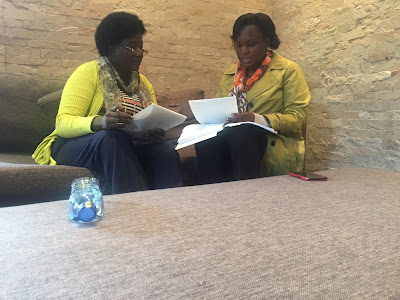 |
| Giving feedback. Image © Lori Gravley |
I’m in a couple of wonderful picture book critique groups,
and I’ve been critiquing for nearly 25 years. I have a set of rules in my head,
and I follow them.
In one of my groups, a member was feeling as if she
couldn’t critique. She didn’t know what
to do or how to begin. Leslee Anne Hewson shared two amazing
resources. The first is an overview of
Critique Groups on Kidlit 411
which compiles links to a variety of resources.
The second is a list of Twenty
Questions to Ask a Picture Book from Rachel Hamby.
These are wonderful resources, full of suggestions and
things to think about, but they don’t focus on attitudes and mental
approaches that can be the foundation of successful critiques. Here are a few attitudes that it’s helpful
for me to remember before I sit down to critique.
1. It's the writer’s
story. It’s
important to keep your critique partners intention for the story in mind when
you review. Let’s say that a writer writes a story in rhyme. You know rhyme is hard to sell, but you also
see plenty of rhyme in the books you read.
A good partner won’t try to convince the writer to rewrite
in prose. Instead, a good partner might identify places where the meter or
rhyme seem strained. After all, it’s
clear that this writer intends the story to be in rhyme. In this instance, it’s
also important to find the story and the character as well. I may not write in rhyme very often, but I
know stories, and I have a trained ear.
So, I wouldn’t ask the writer to rewrite the story in prose, but I would
ask questions and make suggestion so that my writing partner can write the best
rhyming story possible. Not only by
thinking about the rhyme but also by thinking about the story as a whole.
One of the hardest but truest critiques of one of my rhyming
stories was that my story didn’t seem to have the narrative power for a book. If my partner had only been looking at my
rhyme, she might have missed the fact that the story wasn’t living up to a
book-length narrative promise. Her
comments, hard as they were to hear, honored my intent. I had to go back into the story and reexamine
the narrative and character arcs. Those
tough comments helped me see the weaknesses in my story that the fun rhyme were
covering up.
2. Look for what’s
going well. I have to start here. I
graded papers for so long that sometimes the negatives can take over. I
become a walking red pen. I have learned
to find the good in the story first. This good appears both in my overall comments on the story and on the line
edits. I note lines that make me laugh,
lines that seem just right, and lines that inspire me. I always begin my critique comments with
justly deserved praise, both general praise and specific praise, since general
praise can sometimes seem false and generic if not backed up by specifics.
3. Find the places of
tension. Most drafts have places that
slip—the voice changes, the language gets too formal or too casual, the story
moves away from what seemed to be its intent.
Identifying those places of tension can show the writer where she might
go back into the story to make it better.
4. Don’t feel like
you need to solve the writer’s problems.
If you have a suggestion, share it, but if you see a problem but don’t
know how to fix it, feel free to just identify it.
5. Be careful with
line edits. Line editing can be helpful
if a story seems nearly there, but if a story needs more work or some big
revisioning, then line edits aren’t really helpful. You can point out grammatical habits and
vocabulary that don’t seem to benefit the story. You might focus on words that can be
deleted, but for the most part, in my critique groups, we’re still working on
the big questions: audience; tone and
voice; beginnings, middles, and ends; etc.
If the writer is working on revisions, line edits can just be a
distraction. In my groups, if I think a
story is mostly ready and I only want line edits, then I’ll ask.
6. Know that the
writer owns the feedback once you’ve given it.
It’s a gift. If they don’t find
it useful, that’s fine. You did your
best and your comments helped the writer see her story again. You don’t have to worry that you’ll give bad
advice. You don’t have to worry that you
haven’t been hard enough. The whole
point of critique is to help the writer see the work again. What she does with that work once she’s read
your critique are up to her.
No comments:
Post a Comment